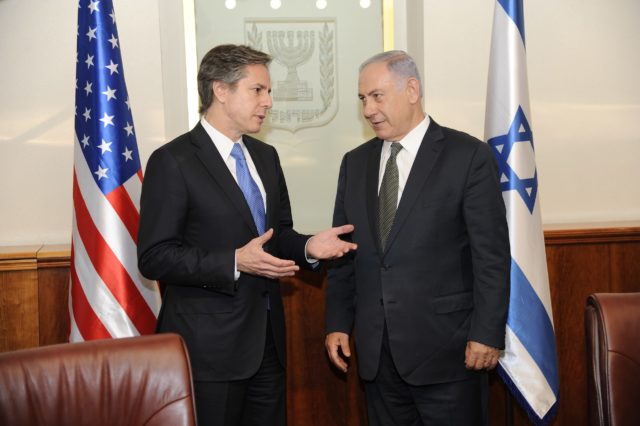After their meeting in Jerusalem on Tuesday, U.S. Secretary of State Antony Blinken and Israeli Prime Minister Benjamin Netanyahu made what were supposed to be “soft” public statements. The politely worded remarks deliberately slid past serious policy differences, but those differences cannot and should not be hidden. Moreover, they should form the basis of conversation between the two allies in the future.
Blinken laid out four reasons for his visit to the region.
First, “to demonstrate the commitment of the U.S. to Israel’s security.” This needs no comment.
Second, “to start to work toward greater stability and reduce tensions in the West Bank and Jerusalem.”
Blinken didn’t mention the six weeks of intense Palestinian Authority (PA) incitement to violence, including speeches and music videos promising glory for those who killed Jews. A music video was repeatedly broadcast in which Palestinians declared, “I fired my shots, I threw my bomb, I detonated, detonated, detonated my [explosive] belts . . . My brother, throw my blood on the enemy like bullets.” Mahmoud Abbas’ religious affairs ministry told viewers, “Islam does not want you to be submissive to others,” and “if you die fighting, you go to paradise; if you kill the enemies, they go to hell.” Check out the “TikTok Intifada.”
This, of course, caused tension for Palestinians who believed Israel ultimately would respond. But in addition, Blinken might have noted the tension in Israel resulting from that same incitement, and the ensuing violence, along with the periodic addition of terrorist Hamas rockets being fired into civilian neighborhoods.
The third reason, said Blinken, was “to support urgent humanitarian and reconstruction assistance for Gaza, to benefit the Palestinian people.”
President Biden did say Hamas would be kept away from the reconstruction money and materiel, but it is unclear how that will be enforced and who will do the enforcing, as the PA has absolutely no control over what Hamas does in Gaza. Neither does the United States. Nor does the United Nations Relief and Works Agency (UNRWA). Nor do the usual European donors, who are, this time, showing some skepticism about pouring more money down the hole.
And fourth, “To continue to rebuild our relationship with the Palestinian people and the Palestinian Authority.”
The PA is not America’s friend—although its president, Mahmoud Abbas, must be overjoyed that the American money spigot is back on, and with the total lack of blame accruing to him, America’s “partner,” for the incitement, including on the Temple Mount. The PA also pays terrorists “salaries” to those who commit violence against Israelis, in violation of U.S. law, and is generally corrupt in its money management.
In all of this, Blinken managed to avoid the underlying issue, which is that Hamas is in a permanent state of war with Israel. And so is the PA. The rockets of May were, for them, just another round of battle, not a new problem and not related to any specific issue/incident in May 2021. Blinken also neglected to mention the ongoing and nasty civil war between Hamas and Fatah that began in 2007 and accounts for much Palestinian bloodshed even now.
Netanyahu had a different view. His points were:
First, “I hope the U.S. will not go back to the JCPOA.” In other words, Iran.
Second, “expand normalization between Israel and the Arab and the Muslim world and deepen the peace treaties that we already have.” This is a vote of confidence for the Abraham Accords, toward which the Biden Administration is notoriously lukewarm.
Third, “to improve the humanitarian conditions in Gaza, including the question of the return of our MIAs and two civilians.” Blinken took no notice—nor did any media outlet—of both living civilians and the Israeli remains being held by Hamas in Gaza.
Fourth, “building economic growth for Judea and Samaria, the West Bank, with international cooperation and participation.” This is much different than agreeing to humanitarian aid for the people of Gaza and recognizes that no one currently has the ability to force Hamas to disarm itself or permit legitimate building for civilian purposes.
And fifth, “peace itself with the Palestinians, a formal peace. I think Biden was absolutely correct when he said you’re not going to get peace until Israel is recognized as an independent Jewish state.”
It is, essentially, a difference in worldview. If you have the Palestinians at the center, the “peace process,” the “two-state solution,” reopening of the U.S. consulate in Jerusalem for Palestinians, restoration of U.S. funds to the PA in spite of the language of the U.S. Taylor Force Act would be at the top of your list. And Israel’s job is to facilitate those things even as it defends itself from PA incitement and Hamas war crimes.
If you believe the terrorist machinations of Iran are at the center, rejecting the JCPOA, retaining the Abraham Accords, and naming Hamas as not only terrorists but also the perpetrators of war crimes are at the top. Recognizing that Iran is the sponsor of Hamas, and that Hamas threatens the PA as well as Israel, accounts for Israel’s less hostile attitude toward the PA even though both have the replacement of Israel by a Palestinian state as their ultimate goal. This explains Israel’s emphasis on recognition by the Palestinians of Israel as a legitimate, independent Jewish State.
The first meeting between the secretary of state and the prime minister laid bare a series of problems that politely slipped past each other. That is not the end of them.


